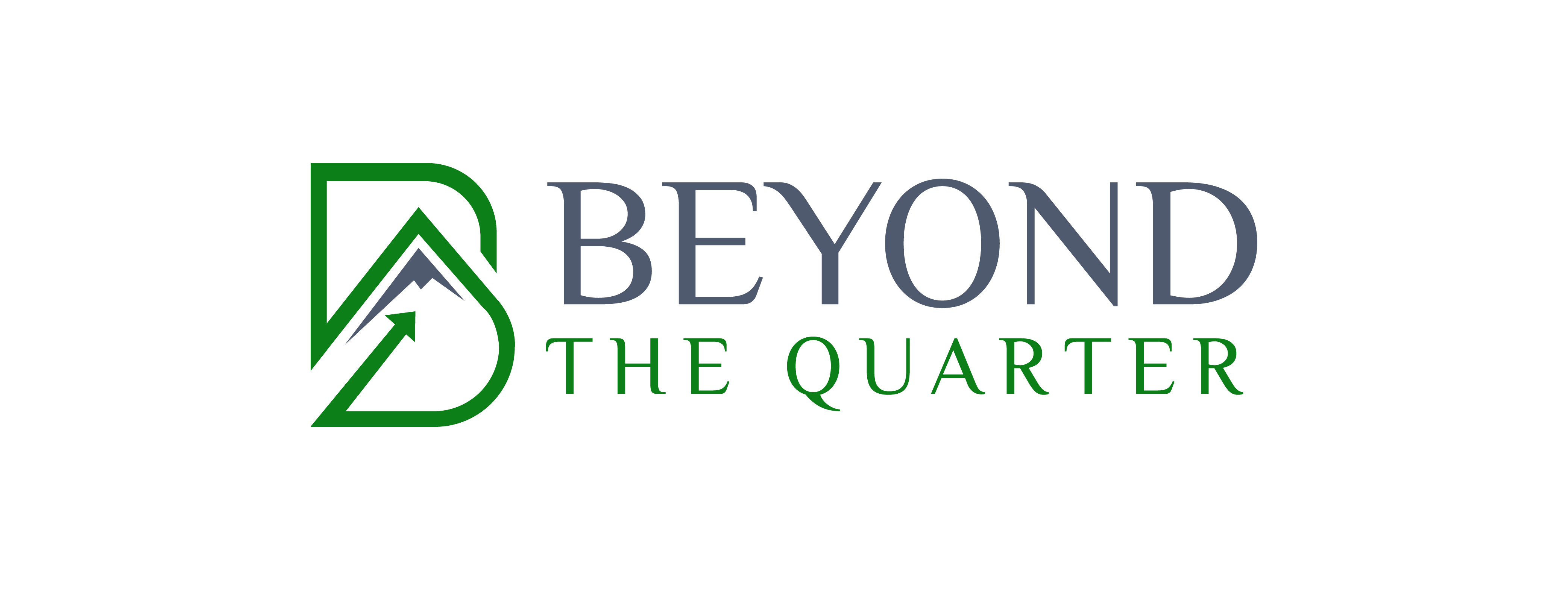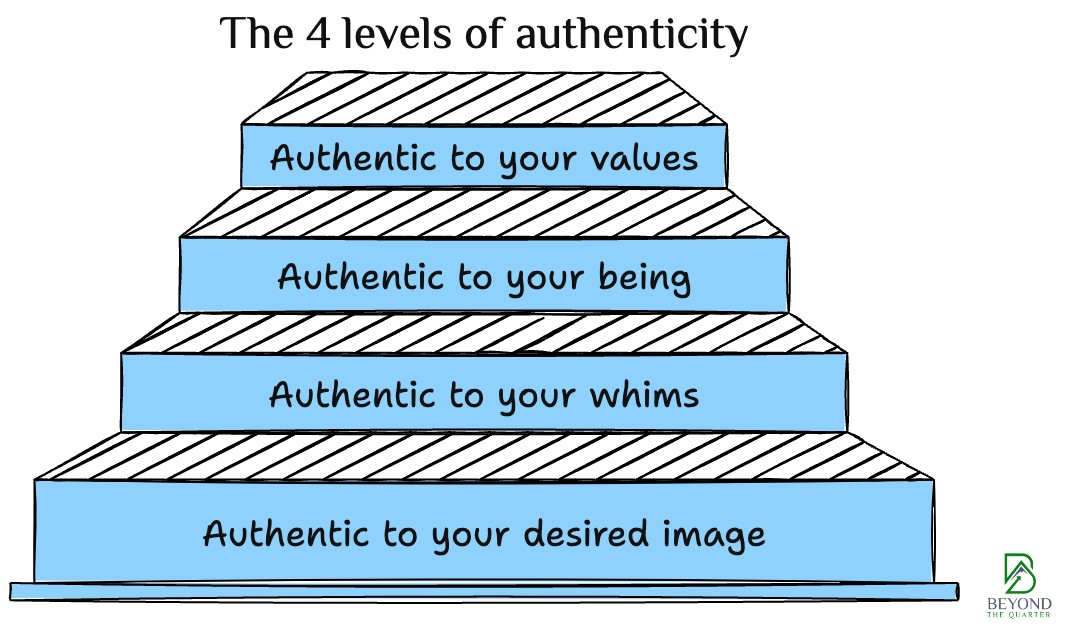Heresy time…
… Beware the trap of authenticity….
… or, to be more precise, especially if you lead, make sure you’re not being authentic to the wrong thing.
We live in a business culture that has made a God/dess of authenticity. Be authentic above all. But if you lead a company, and especially if you’re a founder CEO where your word permeates the whole organisation, you need to ensure you’re being authentic to the things that count.
The levels of Authenticity
I find it useful to look at authenticity at 4 levels. I define them as follows:
- Advertised authenticity. This is being authentic to the image you wish to portray.
- Behavioural authenticity, which is being authentic to what you feel like doing.
- Essential authenticity, which is about being true to who you are.
- Values authenticity, which is to be true to the values to which you aspire.
We all inhabit all 4 of these to some extent. And the lines between them, and even between the bottom and top layer, aren’t completely black and white. But here’s what I believe they look like.
Advertised Authenticity
This is being authentic to the image we’re trying to portray to others. It’s behaving in line with what we want others to think of us.
It’s how you are when you first meet someone you want to impress. A first date. A big boss. Your childhood hero. Or at the school or uni reunion.
It’s your Instagram life.
Arguably, this isn’t authentic at all. This is Enron talking about Integrity as a key value. Advertising an image that actually correlates more to what you think the world wants to see than to what you really are. Which is why it sits at the bottom of the hierarchy.
As we mature emotionally, we feel less of a need to do this, but I’m not sure that it ever entirely goes away.
Behavioural Authenticity
Behavioural authenticity is where we do certain things because we want to, or feel like doing them. It’s a very transient authenticity, an authenticity of convenience. I may normally be a considerate dinner guest, but when I see prawns in that paella in front of me, I’m just going to put as many of them as I can on my plate – the rest of you be damned – because I LOVE PRAWNS and I really feel like having them!
This is me sending you an email last minute saying that I’m not going to come to that meeting we’d set up because I don’t feel like it today – though I’ll probably make up a more dramatic excuse. It’s my being late for something important because I wanted to finish listening to that show on the radio (showing my age…).
It’s doing what I feel like doing, then justifying it by saying that not to do it wouldn’t have been authentic. Which at one level is true – I wouldn’t have been authentic to my feelings or whims at that point in time.
But your whims set a very low bar.
It’s what kids do almost all the time. I see it a lot in the workplace since the dawn of authenticity religion. And in reality, it’s what all of us do from time to time.
Essential Authenticity
Essential authenticity is being true to who you are. If at a behavioural level we’re true to what we feel like doing, then at an essential one we’re being true to our being! It’s “I always wear a clown outfit. It’s who I am. Even if it’s at a job interview / presentation to the governors of the Bank of England / a funeral / any combination of the above.”
It’s a fine line between this and behavioural authenticity, but it’s a real one. It’s the difference between being late as a one-off because that day I felt like it, or being late because that’s in my nature.
I once delivered some group training where well over half the attendees arrived late. Not because of trains, or traffic, or a coordinated pandemic of alarm clock failure. Far from it – many had simply been having a coffee next door.
When they came in, most were unapologetic. They weren’t brandishing their lateness in my face, I hasten to add. But they were blissfully unaware that keeping us waiting, delaying the start of the course for the other attendees, making the experience worse for all might be an issue. It was explained as part of a laid-back culture and “just who we are”. In their eyes, it was OK because they were being authentic to who they were.
They used essential authenticity as the justification. To have been bothered about being on time wouldn’t have been “their true selves”.
No pointing of fingers here – we’ve all done this too. Anytime you catch yourself saying “It’s just who I am”, you’re probably pulling this one.
It’s why I also call it the “self-centred authenticity”.
Values Authenticity
At the top of the stack is what I call values authenticity. It’s being true to who I aspire to be, to the things I believe are important.
Going back to the example of the training group, I should point out that I’m laid back by nature. It can sometimes annoy the bejesus out of my wife. I don’t like to get stressed, so I generally don’t. If you’ve worked with me, you’ll know I’m generally easygoing on things. Sometimes too much so. I like laid back a lot.
But I try not to be rude. So when my tendency to be laid back collides with my tendency to avoid being rude, my don’t-be-rude usually comes out on top. If my being true to my laid-back self means I’m going to be inauthentic to my treating-you-with-respect self, then I’ll do my best to not keep a group waiting. So even though my nature is late, I do my best not to be. And when I fail, I’m mortified to have been “myself”. Which in itself is a good reason not to be late.
Am I being inauthentic? Not true to myself? I’d argue the reverse. I’ve had to figure out which of my true selves – whoever those malevolent jokers are – is the more important.
Or in other words, in my ranking of authenticities, respect is a higher value for me than being laid-backness. I can usually do both, but when they collide and are incompatible in a specific scenario, I’ll try my best to honour the former.
The key there is actually trying. Trying our best isn’t always succeeding. But it is trying. We’ve all done things that we’ve regretted or wished we hadn’t. In most instances, that relates to a violation of a value that we’re trying to live. But we’re none of us angels, so it will happen.
In closing on these levels, note that although I’ve painted bad examples for the first three and a good one for the fourth, it needn’t always be so. We obviously all do exhibit good behaviours and good essences – thankfully. And we can’t define our “authentic selves” on that basis – we are in reality many authentic selves and none. But my point is to highlight that when we don’t do what we think we should do, authenticity is a poor excuse.
It’s also worth considering that none of this is holier-than-thou or to wear your hair-shirt. I love spontaneity , and hold joy and humour as core values. But it is to say that as we mature emotionally and socially, we tend to become more intentional about living in alignment with our values rather than on whim.
Impact for you as leader
So all the above is true for all of us. We all inhabit all 4 levels at various times – that is what it is to be human. But we should value the higher level authenticity more than the others. And the better we get at it, the more we’ll find that they’re all in alignment. If your essence is giving, I’d venture that it’s also a value you hold dear. So your behaviour in helping someone is perfectly aligned with your essence as a giving person and your value of service. All aligned, and all good.
This is even more critical if you lead a company, and especially if you lead it as a founder. Because in those instances, the values that you demonstrate – meaning values authenticity – will have a disproportionate impact on the values of the company, and in turn its culture. You set the tone. You set the norm. Your behaviours define what is acceptable.
If you lead mostly at a behavioural-authenticity level, you’ll be creating mayhem because all will depend on your whim. If it’s at an essential level, all your foibles will be magnified across the company. But at a values level, then you and your company will all be aspiring to be better.
So what to do? In a nutshell, intentionally think about it and decide what authenticity means for you.
1. Decide whether it’s more important for you to be a good leader or one that lives every moment authentically. If you’re truly embracing that you lead to serve, then that needs to form the heart of your authenticity rather than one that is all about what you feel like or who you think you are.
2. Think hard about what your values actually are, and decide which of them you want to be authentic to. Have a strong view on which of them are more important than others if they’re likely to collide. If you’re a founder-CEO, it’s essential to ensure that these are aligned with your company’s values. The 4 levels I’ve defined above are as true for companies as they are for us as individuals.
3. Stop justifying bad behaviours on the basis of authenticity, whether for yourself or your team. Especially your leadership team.
4. Use this 4 layer model (or any other one you find more useful) explicitly around key decisions you make and the way you behave. It should help your figure out what to do at key junctures. Decide on courses of action based not on “it’s who you are”, but rather on “it’s the best version of you”.
5. Accept that these will all evolve, and that we’re all a work-in-progress on a journey. We’ll never be able to tick the box of “values – done”. And our human nature means that our many authenticities will also always do battle. Accept this, and keep on walking down the road.
Finally, if respect for others is a higher value to you than your desire to finish your coffee, then let your coffee go cold.
Or better, make another one quickly and bring it into your training course for the trainers. Make latte, not late.
How we can support you
- Join us to support you as you scale your company; create time to focus on the bigger picture; and keep values and purpose at the core.
- Subscribe to our Bite-Sized Business Tips - thought snippets for values-centred business leaders. Every few days, a short focussed read on a specific topic of how to lead a company that values both profit and purpose.
- Talk to us to explore how we can help you scale your company in the direction you want to take it.

